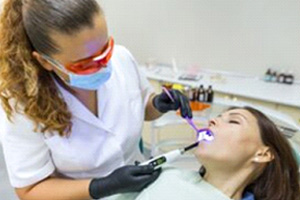Do you feel nervous about visiting your dentist? Are you worried that dental work will cause you pain? You can rest assured that modern dentistry prioritizes patient comfort. Your dentist has many tools they can use to help you feel more comfortable in their care and to manage potential pain.
However, the medications they use to induce a calm sensation in patients (sedation) and the ones used to block pain (anesthesia) work in different ways. Your dentist can explain the benefits of each in detail at your next dental check-up. You can also read on to learn the differences between anesthesia and sedation as well as how your dentist can employ both of these treatments in your dental care.

Local Anesthetic
Many cases of dental anxiety stem from the anticipation of pain during a dental procedure. Fortunately, your dentist will take measures to stop discomfort prior to beginning dental work using a local anesthetic.
The dentist will inject this medicine into a targeted nerve where it will block it from transmitting sensation to the brain. This numbs the area so that you do not feel anything when the dentist starts the necessary dental work.
To further maximize the patient’s comfort, the dentist will use a topical anesthetic to numb the area before administering the injection. The dentist can use this medicine during many routine procedures, including dental fillings.
Dental Sedation
Your dentist can also specific medicine that helps a patient relax rather than stop pain specifically. Sedation dentistry can make a patient feel calm, though the degree of the effects may vary depending on the type of sedation you choose.
Nitrous oxide, also known as laughing gas, is breathed through a mask throughout the procedure. You can feel calm and even euphoric, though you will remain conscious. Effects will cease as soon as you breathe normal oxygen again.
Oral conscious sedation involves taking a prescribed tablet prior to your dental appointment. The patient will feel relaxed at the dentist’s office yet will stay awake. However, they will feel groggy enough following their dental work that they will need someone to take them home.
General Anesthesia
General anesthesia refers to the type of medicine you can expect before a surgery. The medicine will allow you to be unconscious for the duration of the procedure, and then you awake sometime after the medicine is removed. Health professionals reserve this type of treatment for intense procedures like implant dentistry or other oral surgeries.
They administer anesthesia intravenously, so you can expect the effects to begin quickly and then fade gradually after the medicine stops. You could feel disoriented for the rest of the day after this medicine. So you should arrange for a lift home from the dentist’s office.
Learn more about your eligibility for each of these treatments by consulting with your dentist. They can help you find the best way to feel calm during your next dental appointment using these treatment options.
